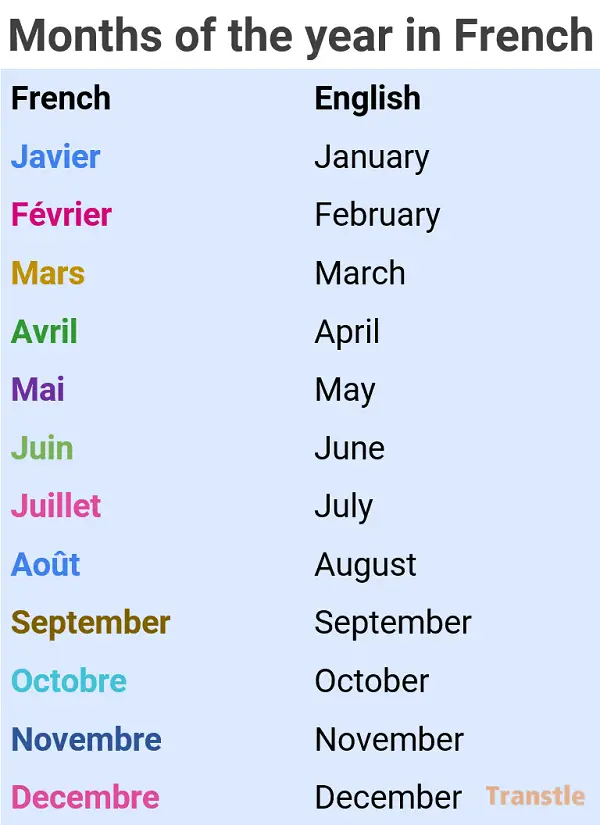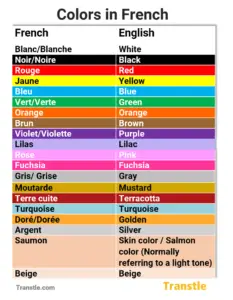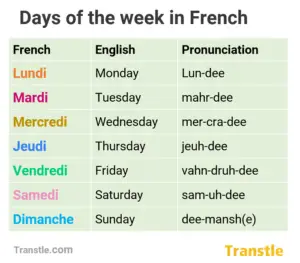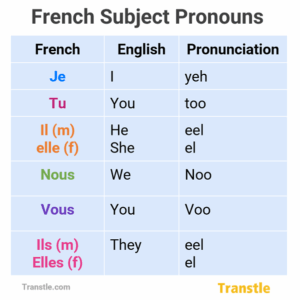Months of the year in French with Pronunciation and Examples

Ready to talk about your birthday, plan events, or simply describe the time of year in French? Learning the months of the year in French (les mois de l’année) is fundamental vocabulary that helps you navigate daily conversations and understand French culture. Just like the days of the week, these words are crucial for situating yourself in time.
While seemingly simple, there are a few key French grammar rules and pronunciation tips to follow for fluent communication. Let’s dive in!
See also: Days of the week in French
The Months of the Year in French
Here’s a comprehensive list of the months, along with a simplified pronunciation guide and common examples.
| French Month | English Equivalent | Simplified Pronunciation |
|---|---|---|
| Janvier | January | jahn-vee-AY |
| Février | February | fay-vree-AY |
| Mars | March | mahrs |
| Avril | April | ah-vreel |
| Mai | May | may |
| Juin | June | jwen (like “gwen” but with a nasal ‘en’ sound) |
| Juillet | July | jwee-YAY |
| Août | August | oot (silent ‘g’) or ah-oot (depending on region) |
| Septembre | September | sep-TAHM-bruh |
| Octobre | October | ok-TO-bruh |
| Novembre | November | no-VAHM-bruh |
| Décembre | December | day-SAHM-bruh |
Essential Grammar Rules for French Months
1. No Capitalization for Months
Unlike in English, months of the year in French are not capitalized. This is a common pitfall for English speakers!
|
2. Saying “It’s [Month]”: Using “C’est”
To simply state what month it is, use the impersonal expression c’est (it is) followed directly by the month.
|
3. Referring to Events in a Month: Using “En“
When indicating that an event occurs or will occur in a certain month, use the preposition en (in) before the month. This little word is versatile in French! You can learn more about the preposition “en” in detail.
|
4. Referring to Specific Dates: Using “Le”
When you refer to a specific date (a particular day within a month), you must use the definite article le (the) before the number of the day, not “en.”
|
For a deeper dive into how French articles like “le” work, check out this guide on French definite articles.
Common Words and Expressions Related to Time
Expand your time-related vocabulary with these frequently used French words:
| French (Gender) | English Equivalent |
|---|---|
| Mois (m) | Month |
| Année (f) | Year |
| Semestre (m) | Semester |
| Siècle (m) | Century |
| Millénaire (m) | Millennium |
| Décennie (f) | Decade |
| Année bissextile (f) | Leap year |
Let’s see the months and related vocabulary in action!
|
Exercises
Test what you’ve learned with these simple exercises.
Exercise 1: Fill in the Blank
Complete the sentence with the correct month in French, remembering the lowercase rule.
- My birthday is in __________ (May).
- Christmas is in __________ (December).
- I love the month of __________ (August).
- School begins in __________ (September).
Exercise 2: Translate to French
Translate the following sentences into French.
- My birthday is on July 12th.
- Winter is in January.
- The party is on May 20th.
- My brother arrives in April.
Answers
Exercise 1
- mai
- décembre
- août
- septembre
Exercise 2
- Mon anniversaire est le 12 juillet.
- L’hiver est en janvier.
- La fête est le 20 mai.
- Mon frère arrive en avril.
Read next

Colors in French: Complete List and Pronunciation
Learn colors in French! Complete list of colors in French with pictures, sentences, and pronunciation.

Days of the Week in French: The Best Guide
The days of the week in French with pronunciation, grammar rules, and examples. Learn them today!

French Subject Pronouns: A Complete Guide, Examples, Exercises
French personal pronouns (in English I, you, he/she, we, they, etc.) reflect the subject of the sentence.